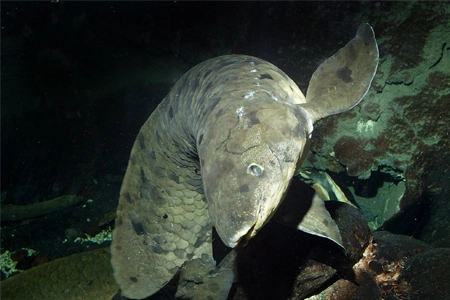by Editorial Staff | March 28, 2016
- Science
Lungs are essential to life, and not just for humans. Today we want to introduce you to Granddad, a 100-year-old lungfish whose unique respiratory system—having both gills and a lung—not only help him to survive, but may also be key to the evolutionary origins of the lung.
Granddad is the oldest fish we know of anywhere in the world. He resides at the Shedd Aquarium in Chicago, where he's lived for more than 82 years. Granddad is a very popular animal not only for folks who know his history, which is illustrated at his exhibit, but for those who don't know his history but love his great personality and looks, according to George Parsons, Senior Director of Fishes at the Shedd Aquarium.
Granddad's story
Back in 1932, the Shedd Aquarium Director Walter E. Chute was at work creating a unique collection of fish to attract visitors during the Chicago World's Fair, which would take place the following year. He had a crew in Hawaii collecting specimens for the exhibit when he learned that the steamboat on which they were traveling was headed to Australia, the native home of the Queensland lungfish—a fish that could breathe air. Chute sent a letter to the director of the aquarium at Sydney's Taronga Zoo and his crew returned home in 1933 with not one, but two lungfish: Granddad and his mate, who lived until 1980.
These days, Granddad spends most of his time doing his best imitation of a fallen log. He breathes both underwater and from the surface, and has been known to startle his caretaker with loud snorts when he comes up for air.
A rare species
Throughout the world, there are only 6 species of lungfish—one in South America, one in Australia and four in Africa. The Australian (or Queensland) lungfish is the most primitive out of the bunch with only a single lung, compared to the paired lungs the others have. Being able to breathe air makes Granddad particularly fascinating because of the advantage it gives him out in the wild: surviving droughts and surviving in general.
Most fish will dig mud pits or retreat to crowded pools of water to survive when harsh heat causes rivers to dry up in tropical climates. This is problematic as fish get crowded together. If you've ever been in a room that is packed to the gills (pun not intended), you'll know that things can get uncomfortable fast—it gets hot and the air gets really stuffy. Same goes for this large pool of evaporating water. With more fish using up the remaining oxygen in the shrinking pool of water, the less oxygen is available underwater for the fish to breathe. Here's where lungfish have an advantage. Unlike other fish with gills alone, lungfish can surface, take a breath and survive when other fish might be lacking air. In fact, much like many sea mammals, lungfish are obligate air breathers—they have to breathe air above water periodically to survive.
A missing link?
Many scientists theorize that lungfish could be the missing link between when mammals millennia ago left the sea to become land dwellers. And if you had to imagine what that animal, who served as an evolutionary bridge might look like, it would probably look like Granddad. Four fins, an almost crawling—like way to move around, a single basic lung with a lot of capillaries and a decided preference for lettuce and sweet potatoes (OK, maybe that last part is special to Granddad).
Special thanks to George Parsons, Senior Director of Fishes at the Shedd Aquarium, who let us pick his brain and created in us a shared enthusiasm for aquatic life, biology and the amazing work the Shedd does to maintain the most diverse collection of exotic animals in the world.
Blog last updated: October 24, 2025



